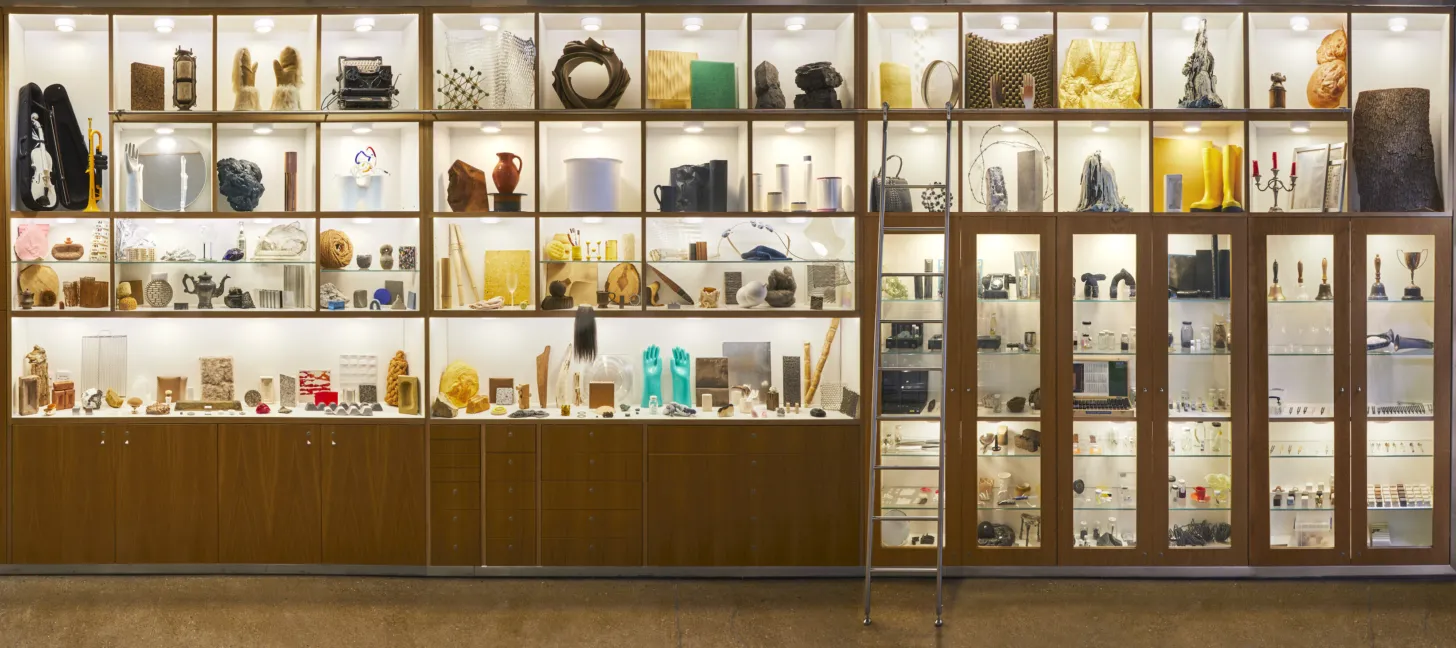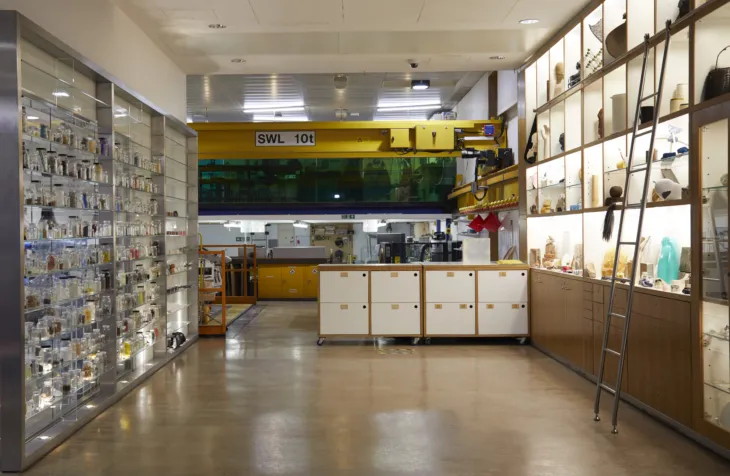- Home
- About
About
The Institute of Making
The Institute of Making is a multidisciplinary home for all those interested in the made world: from makers of molecules to makers of buildings, synthetic skin to spacecraft, soup to diamonds and socks to cities. We exist to explore, investigate and celebrate all aspects of materials and processes.
From our large-scale public events to our ground-breaking academic research, our various projects have one thing in common: they unite our diverse audiences in their shared passion for materials and making. Our array of activities and facilities provide a creative home for people to collaborate, contemplate and engage with a wide range of materials, processes, tools and techniques.

Our Ethos
We believe in getting up close and personal with real, physical processes in a real, physical space. Being hands-on with care, rigour and delightful curiosity, whilst always giving things a go, is imperative to our work. In all that we do (from our Festival of Stuff extravaganza for thousands of people to our in-depth research projects with highly focused objectives), we define ourselves by our experimental, interactive, celebratory mindset.
The Institute of Making values collaboration: bringing people, processes and materials together, asking questions, trying things out and sharing our discoveries. We have a non-hierarchical approach to who knows what about the world, and find joy and delight in the everyday. We also relish in the possibility of small, curious starting points that have the power to enable profound change in society. Some things are important and delightful—and others are just delightful. We never discriminate between them.
Our Spaces
Institute of Making Bloomsbury houses our original Materials Library collection, alongside a multi-material workshop that we like to think of as a dream garden shed. Our plethora of tools and equipment share one open-plan, 250m2 space; enabling an abundance of making processes and materials experimentation.
In 2023 we began expanding the Institute of Making through a second space on the Olympic Park in Stratford, as part of UCL East development. The Bloomsbury space continues to offer facilities at the heart of UCL’s central London campus, whilst the Stratford space provides new types of equipment and an opportunity for members to make on a larger scale, for longer periods of time.
Institute of Making Stratford is 1,000m2 of bespoke facilities, designed to expand the depth and breadth of what we can do - whilst also maintaining our experimental, hands-on and celebratory approach to all aspects of materials and making. At its centre is our large, open-plan studio and multi-materials workshop, surrounded by a number of specialist rooms offering dedicated spaces for ceramics, CNC machining, electronics, 3D printing, plastic processing, metal work, textiles, food and the Materials Library.
Find out more about our workshop offerings here.
Our Materials Library
The Materials Library is a collection of some of the most wondrous materials on earth, gathered from sheds, kitchens, labs and factories around the world. Our shelves, cabinets and drawers are bursting at the seams with lumps, chunks and jars full of stiff, gloopy, shiny, nanoscopic stuff. This collection puts familiar, everyday materials on an equal footing with their more unusual counterparts from research laboratories and high-tech manufacturing facilities; exploring the fascinating stories behind both the mundane and the mysterious.
The Materials Library celebrates pure curiosity through encouraging play and experimentation with materials. At its core, it is a handling collection that emphasises the importance of sensory experience when learning about materials, and you are encouraged to get hands-on and wobble, smear, scrape and sniff your way around the collection.
Our Materials Library collection is housed in our Bloomsbury and Stratford workshops. Our collections can be accessed by members during normal opening hours, and by visitors during our public events or via the growing digital catalogue.
Find out more about the Materials Library here.

Our Events
Our wide-ranging events programme offers access to unique, hands-on activities for members and the general public alike. We welcome people into our spaces to experience, explore and delight in a wide range of making processes, and celebrate all aspects of materials.
Our programme includes a yearly summer Festival of Stuff extravaganza that is free and open to all, a series of masterclasses where expert makers teach small groups specialist skills, and special projects such as our Repair Cafes and workshop residencies for makers.
Many of our events are ambitious in their scale and scope - think one huge steam engine called Dorothy; forty-eight embroidered nipples; ninety contributing makers, engineers, scientists and artists; one tonne of recycled HDPE plastic pellets; thousands of members of the public who played eighteen rounds on the world’s first and only materials science crazy golf course - all in one year.
We carefully curate our events so that we celebrate the skills of accomplished makers, whilst also fostering exciting dialogues between specialist practices; creating unexpected connections and surprising moments whilst remaining resolutely practical.
Find out more about our events programme here.
Our Research
The Institute of Making carries out multidisciplinary research on the topic of materials, materiality and the made world. To do this, we initiate projects where engineering, physics and chemistry intersect with the arts, design, humanities and social sciences. For instance, we research topics as seemingly diverse as plastic waste, the design of prosthetics, the materiality of performance and the taste of materials. What knits these projects together is our method, which is to assemble multidisciplinary research teams that champion the craft and practice of making and connect it to fundamental materials science. We do this with not just with practitioners and academics, but also in partnership with the public, policy makers and businesses.
Find out more about our research projects here.

Membership
On a day-to-day basis, we bring together students and staff from across UCL, hosting them in our Materials Library and multi-materials workshop spaces to make, break, fix, create, research, invent and investigate.
Members are free to make anything their hearts’ desire, ranging from personal passion projects to apparatus for multimillion pound research initiatives. Whether you want to learn how to throw a pot on the wheel, mend your trousers or prototype an innovative new form of heart valve, the Institute of Making welcomes you.
Our workshop spaces in Bloomsbury and Stratford are staffed by our friendly and supportive technicians, enabling anyone at UCL to access and be trained on a number of tools and processes - no matter their experience level. All members can access our physical Materials Library in Bloomsbury and the emerging collection in Stratford, with support from our Materials Library team.
Membership and use of the Institute of Making is freely available to all UCL staff and students after completion of the New Members Induction.
Find out more about becoming a member here.

UCL’s Faculty of Engineering Sciences
In 2012 the Institute of Making was given a home by the UCL Faculty of Engineering Sciences, who generously fund our spaces, programmes and activities, and provide invaluable support and encouragement on a daily basis.
For more information on UCL and the Faculty of Engineering, please see here.












